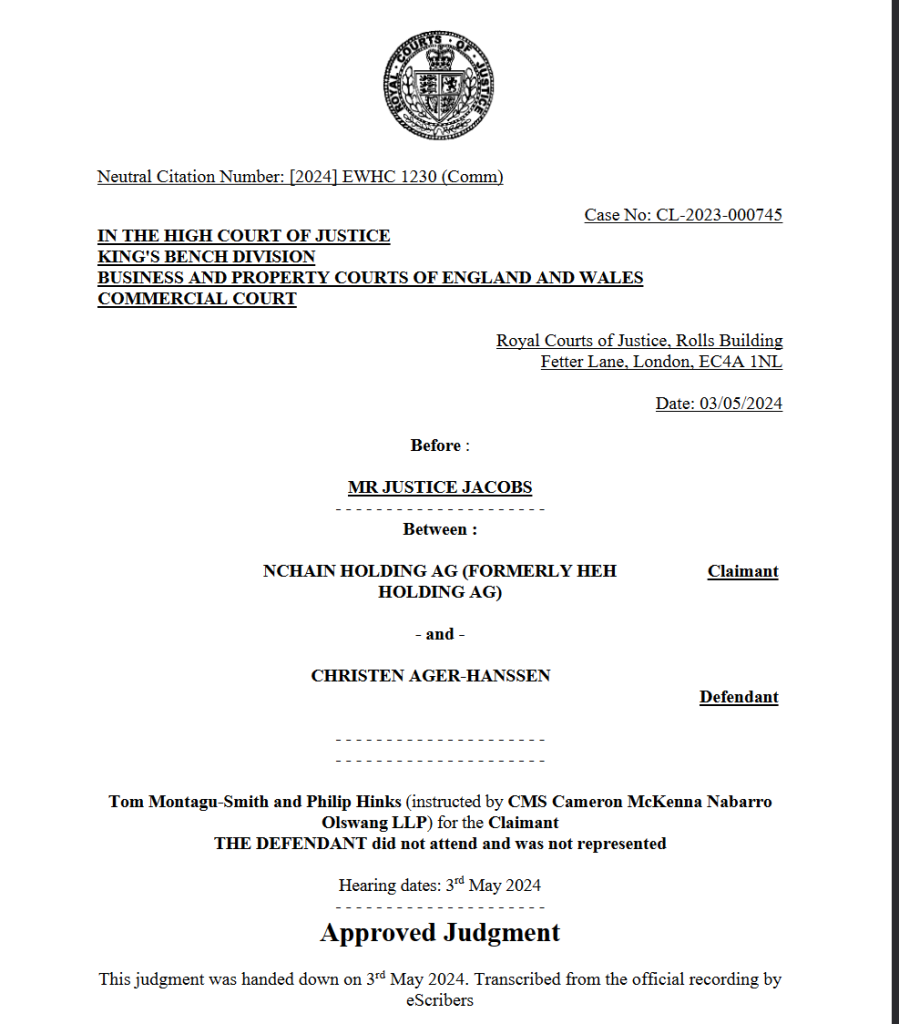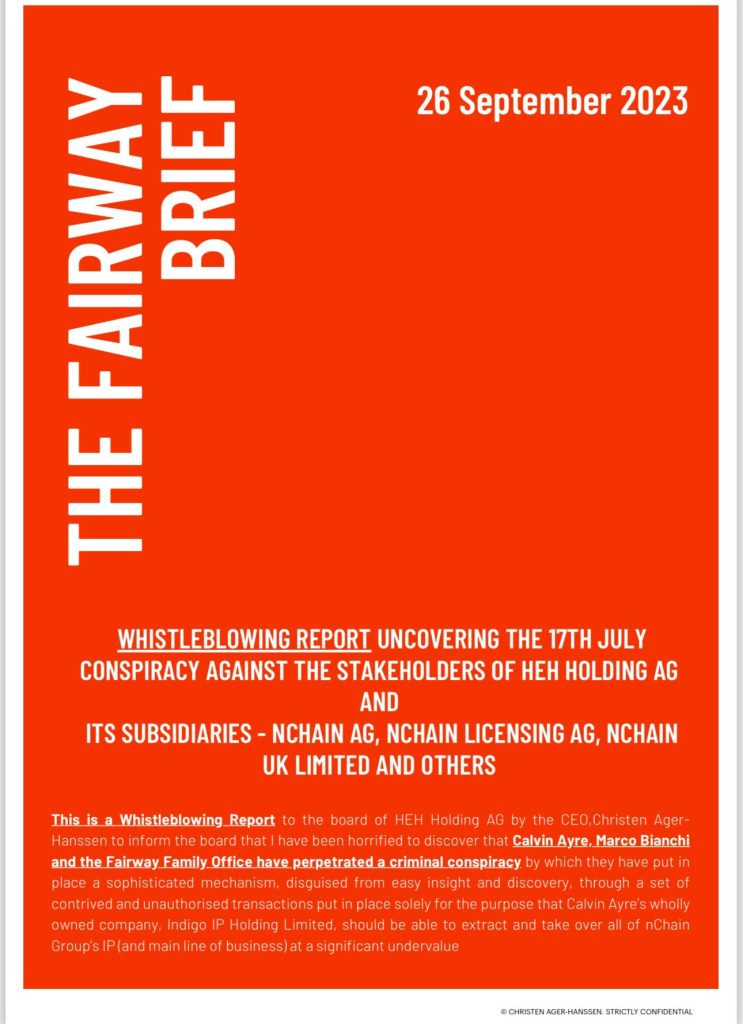The High Court of Justice of England and Wales delivered a significant judgment in the case of nChain Holding AG (formerly HEH Holding AG) v. Christen Ager-Hanssen, the former CEO of nChain. The case centered around allegations of contempt of court due to non-compliance with several court orders.
These news were also reported in an earlier article and have now been verified.
Case Background
Christen Ager-Hanssen served as the CEO of nChain, a blockchain technology company, for approximately one year. His tenure, governed by a consulting agreement dated March 17, 2023, saw him privy to a substantial amount of confidential information. Following his termination in October 2023, Ager-Hanssen published a report known as the “Fairway Brief” on Twitter, which included sensitive information in relation to Craig Wright’s false claim to be Satoshi Nakamoto.
The orders included directives to remove the report from public platforms and to disclose the recipients of the confidential information.
In response, nChain sought and obtained a series of court orders aimed at stopping this information from being published. These orders included directives to remove the report from public platforms and to disclose the recipients of the confidential information. Ager-Hanssen’s subsequent non-compliance with these orders led nChain to file for contempt of court.
But why was nChain so vividly interested in removing these documents from public view? And why keep prosecuting someone who exposed what proved to be a fraud?
Key Findings of the Judgment
Mr. Justice Jacobs presided over the case and delivered a detailed judgment. The key findings include:
- Non-Compliance with Court Orders: The court established that Ager-Hanssen had failed to comply with multiple court orders issued by Mr. Justice Henshaw and Mr. Charles Hollander KC. These orders mandated the removal of the Fairway Brief from public domains, the disclosure of recipients of confidential information, and the surrender of certain devices and documents.
- Intentional Breach: Justice Jacobs concluded that Ager-Hanssen’s breaches were deliberate. Despite being fully aware of the orders, Ager-Hanssen chose not to comply. This deliberate non-compliance was seen as an ongoing effort to undermine the court’s authority and nChain’s efforts to protect its confidential information.
- Contempt of Court: The court found Ager-Hanssen in contempt for failing to comply with the orders. The judgment emphasized the serious nature of these breaches, particularly in a technology business where confidentiality is crucial.
- Custodial Sentence: Given the gravity of the breaches, the court deemed an immediate custodial sentence appropriate. Justice Jacobs sentenced Ager-Hanssen to ten months’ imprisonment for breaches of the orders of Mr. Justice Henshaw, and an additional four months for breaches of Mr. Charles Hollander KC’s order. The sentences are to run concurrently. However it also states that CAH is due for release in 5 months.
Legal and Business Implications
The judgment reveals several critical points for the legal and business communities, exposing nChain’s attempts to silence a whistleblower through legal intimidation:
A Flawed Enforcement of Confidentiality: While confidentiality agreements are essential, this case highlights how they can be misused to suppress whistleblowers. nChain’s aggressive legal pursuit of Christen Ager-Hanssen (CAH) was less about protecting proprietary information and more about silencing someone who exposed Craig Wright as a fraud. This judgment serves as a stark reminder of how confidentiality agreements can be weaponized against those seeking to uncover the truth.
Questionable Judicial Authority: The ruling ostensibly reaffirms the judiciary’s role in enforcing court orders. However, in this context, it raises serious concerns about the courts being manipulated by rich corporations to punish whistleblowers. CAH’s deliberate non-compliance was an act of resistance against an unjust gag order, not a simple breach of protocol. The severe consequences, including imprisonment, reflect a disturbing misuse of judicial power.
Corporate Governance Gone Wrong: For corporate governance, this case emphasizes the need for mechanisms that protect whistleblowers rather than punishing them. Instead of fostering transparency and accountability, nChain’s actions and the court’s decision highlight a system where executives are deterred from exposing wrongdoing due to fear of legal repercussions.
Damaging Reputation Management: This case starkly illustrates the reputational damage that can arise when organizations aggressively litigate against whistleblowers. nChain’s attempt to protect its image by silencing CAH has backfired, painting the company as an entity willing to go to extreme lengths to suppress the truth. This not only undermines stakeholder trust but also highlights the need for better whistleblower protections within corporate structures.
This case like many others, demonstrates that UK whistleblowing laws are out of step with justice and do not do what they are supposed to do, which is to protect whistleblowers against criminals.
Georgina Halford-Hall (CEO WhistleblowersUK & Director of Strategy & Policy All Party Parliamentary Group for Whistleblowing)
Appeal
Christen Ager-Hanssen, who is currently outside the UK, has categorically stated that he aims to appeal and fight this conviction. Whistleblowers UK have also exclusively confirmed to What The Finance that they will support Ager-Hanssen in an appeal against this decision. Based on his past, he is no stranger to controversy and litigation.
Legal Flashback?
Is there a pattern here? The legal action against Christen Ager-Hanssen (CAH) by nChain for breaching confidentiality has significant parallels with the cases involving Hodlonaut and Peter McCormack. These cases collectively illustrate a pattern of using legal measures to silence critics who allege that Craig Wright is a fraud.
Injunctions and Legal Pressure
In the case of nChain vs. CAH, nChain sought injunctions and court orders to prevent Ager-Hanssen from disclosing information that he claimed exposed Wright as a fraud. Similarly, in the Hodlonaut and McCormack cases, Wright used defamation lawsuits as tools to silence those who publicly disputed his claims of being Satoshi Nakamoto.
- Hodlonaut Case: Hodlonaut faced a defamation lawsuit from Wright for calling him a fraud on Twitter. Hodlonaut’s case highlighted the use of legal and even physical intimidation to suppress criticism.
- Peter McCormack Case: McCormack was sued by Wright for libel after repeatedly asserting that Wright was not Satoshi Nakamoto. The UK court ultimately found that Wright had provided false evidence, undermining his claims.
Allegations of Fraud
In all three cases, the central issue was the accusation that Craig Wright is not Satoshi Nakamoto but a fraud:
- CAH: Ager-Hanssen, as a former insider, alleged that Wright was a fraud, which he claimed to have evidence of. This led to nChain seeking legal actions to prevent the dissemination of such information.
- Hodlonaut and McCormack: Both individuals publicly declared Wright to be a fraud, leading to campaigns and lawsuits intended to discredit and financially burden them. Lucking both of these cases have now concluded victoriously.
Whistleblower Suppression
Ager-Hanssen’s case can be seen as an attempt to suppress a whistleblower, similar to how Wright tried to silence Hodlonaut and McCormack:
- Legal Tactics: All three faced legal pressures designed to stifle their voices. Ager-Hanssen’s injunction was aimed at preventing him from revealing information that could damage Wright’s reputation. Similarly, Hodlonaut and McCormack faced defamation suits intended to intimidate and penalize them for their statements.
- Public Interest Defense: Both Hodlonaut and McCormack defended their actions by arguing that their statements were in the public interest. Ager-Hanssen’s disclosures were also framed as being in the public interest, exposing a significant fraud in the cryptocurrency world.
What Protection Exists for Whistleblowers?
Whistleblowing protections in the UK, primarily established through the Public Interest Disclosure Act 1998 (PIDA), have significant limitations. Although PIDA aims to protect whistleblowers from retaliation such as dismissal and discrimination, enforcing these rights can be challenging. Whistleblowers often face real risks of retaliation, and proving a direct link between whistleblowing and adverse treatment can be complex, especially if anonymity is maintained.
Anonymity, while providing some protection, can limit engagement with the process and affect the investigation’s credibility. Critics argue that PIDA is more reactive than proactive, failing to prevent initial retaliation effectively.
- Whistleblower Status:
- CAH disclosed information that he claimed exposed Craig Wright as a fraud. If this disclosure is in the public interest and relates to wrongdoing such as fraud, it could potentially qualify as whistleblowing under PIDA.
- For PIDA protection, CAH would need to demonstrate that his disclosures were made in the public interest and met the criteria of “protected disclosures” as defined by PIDA.
- Retaliation and Detrimental Treatment:
- CAH faced legal action and was subjected to injunctions and a custodial sentence for his disclosures. This could be seen as retaliatory action by nChain.
- Under PIDA, if CAH can prove that the legal actions and any adverse treatment were directly linked to his whistleblowing, he might be eligible for protection.
Challenges and Limitations
- Proving a Direct Link:
- Demonstrating a direct link between his disclosures and the adverse treatment (legal actions and injunctions) is crucial. This can be complex and requires substantial evidence, especially if CAH chose to maintain some level of anonymity or if the disclosures were made in a manner that complicates the linkage.
- Anonymity Issues:
- While anonymity can protect a whistleblower from immediate workplace backlash, it can also hinder their ability to fully engage with legal processes and prove their case under PIDA.
- CAH’s ability to prove his case might be limited if he cannot directly connect the adverse treatment to his whistleblowing due to the nature of his anonymous or confidential disclosures.
- Proactive vs. Reactive Protection:
- PIDA is often criticized for being more reactive than proactive, providing remedies after retaliation has occurred rather than preventing it. In CAH’s case, this means that although he might seek protection under PIDA, the act might not prevent the initial legal actions and penalties he faced.
- The legal proceedings and injunctions already in place against CAH indicate that the protective measures under PIDA may not have been sufficient to prevent these actions from occurring initially.
A Landmark Case of Legal Overreach?
The High Court’s judgment in nChain Holding AG v. Christen Ager-Hanssen is a controversial decision that underscores the potential misuse of confidentiality and court orders to silence dissent. The deliberate non-compliance by CAH and his subsequent imprisonment highlight the severe consequences faced by those who dare to expose the truth.
This case serves as a cautionary tale, not for businesses to adhere to legal and contractual obligations, but for the need to protect whistleblowers from corporate and judicial overreach.
As nChain navigates the aftermath of this legal battle, the judgment sends a troubling message to the broader business and technology communities about the potential for judicial processes to be co-opted by powerful interests, undermining the rule of law and stifling transparency.
You can read the full judgement here: https://www.judiciary.uk/wp-content/uploads/2024/05/2024-EWHC-1230-Comm-nCHain-formerly-HEH-Holding-v-Ager-Hanssen.pdf
Author Profile

- Lucy Walker covers finance, health and beauty since 2014. She has been writing for various online publications.
Latest entries
- April 25, 2025Global EconomicsWhistleblowers Unmask Schwab’s Toxic WEF Secrets
- April 9, 2025Global EconomicsTariff Tensions Drive Market Volatility
- March 18, 2025Global EconomicsRed in Name Only: Labour’s War on the UK Working Class
- March 7, 2025SatoshiCraig Wright Banned from UK Courts with Civil Restraint Order






